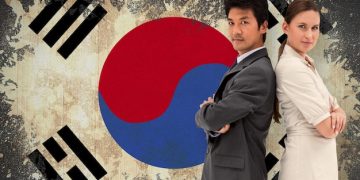The portrayal of traditional Korean values in K-dramas

Anúncios
The portrayal of traditional Korean values in K-dramas highlights family dynamics, respect, and cultural heritage, making these stories resonate with viewers both in Korea and globally.
The portrayal of traditional Korean values in K-dramas has captivated audiences worldwide, blending rich cultural narratives with relatable stories. Curious about how these dramas showcase values like family and respect? Let’s dive in.
Anúncios
Understanding traditional Korean values
Understanding traditional Korean values is essential to appreciating the depth and richness of K-dramas. These values are woven into the narratives, helping viewers connect with the characters and their journeys. By exploring these values, we can uncover what makes these stories resonate with such a wide audience.
Core Values in Korean Culture
At the heart of traditional Korean values are respect, family, and community. These elements are often depicted in scenes where characters display filial piety or prioritize family over individual desires. This cultural backdrop adds a unique depth to the stories, setting the stage for emotional connections.
Anúncios
Significance of Respect
Respect is a cornerstone of Korean society and a recurring theme in K-dramas. Characters frequently show respect to their elders, which fosters a sense of harmony and stability. These portrayals highlight how honor and reverence influence interactions, especially within families. Understanding this dynamic helps viewers grasp the underlying message of unity in many dramas.
Key Aspects that Shine Through
- Family bonds: The importance of family is emphasized through relationships that endure hardships, showcasing love and sacrifice.
- Ties to heritage: K-dramas often reflect on cultural traditions, including customs and rituals that define identity.
- Community support: Many stories illustrate how communities come together in times of need, demonstrating solidarity and cooperation.
These aspects depict a society where connections matter greatly. As people watch these narratives unfold, they often find reflections of their own values. Stories in K-dramas resonate deeply with audiences because they remind us of the long-lasting impact of values on our lives.
In the end, the portrayal of traditional Korean values enhances the storytelling experience. It invites viewers to dive into cultural richness while learning about the principles that shape behavior and relationships.
How K-dramas reflect family dynamics

K-dramas are known for their vivid storytelling, and a key element is how they reflect family dynamics. These shows often portray the complexities of family relationships, allowing viewers to connect with the characters on a personal level.
Common Themes in Family Dynamics
Many K-dramas explore themes of love, conflict, and resolution within families. Characters often face challenges that test their bonds. The resolutions presented highlight the importance of understanding and forgiveness in mending relationships.
Representation of Generational Differences
Generational differences play a vital role in character interactions. Younger characters often clash with older generations over values and expectations, which leads to dramatic but relatable moments. These differences are depicted in a way that emphasizes mutual respect, which is a cornerstone of Korean culture.
Key Aspects of Family Dynamics
- Support systems: Family members often act as main supporters, showing how their backing is crucial during tough times.
- Sacrifice: Characters frequently make personal sacrifices for the sake of their family, demonstrating the depth of their love.
- Conflict resolution: Lessons learned through conflicts often emphasize the importance of communication and compromise.
As the stories unfold, viewers witness how these family dynamics shape characters’ decisions and growth. The portrayal of familial love and responsibility resonates deeply, creating a shared experience that many can relate to. K-dramas not only entertain but also provide valuable insights into the fabric of family life, showcasing how love and understanding can overcome adversity.
The significance of respect in K-dramas
The significance of respect in K-dramas cannot be overstated. These shows often highlight how respect shapes relationships between characters, offering lessons that resonate with viewers. Through their interactions, the importance of mutual respect becomes clear, illustrating key aspects of Korean culture.
The Role of Respect in Relationships
In K-dramas, respect is depicted as fundamental to maintaining harmony. Characters often show respect to their elders, peers, and even adversaries. This practice not only reflects societal norms but also sets an example for viewers. The bonds formed through respect demonstrate how essential it is for healthy relationships.
Symbolism of Respectful Actions
Respectful actions, such as bowing or using honorific language, are common in K-dramas. These behaviors symbolize deep-rooted traditions and values. They are not just cultural elements but serve to elevate the storyline, providing depth to character development. The audience understands that respect plays a crucial role in the storyline’s progression.
Key Elements of Respect in K-dramas
- Cultural traditions: Many dramas emphasize traditional values, showcasing how respect ties into everyday life.
- Conflict resolution: Respect often paves the way for resolving conflicts, promoting forgiveness and understanding.
- Character growth: Characters who learn to respect others often experience significant personal growth throughout the series.
As viewers engage with these stories, they are often reminded of the importance of respect in their own lives. This connection enriches the viewing experience, making K-dramas not only entertaining but also educational. The portrayal of respect in K-dramas effectively reflects Korean values, showcasing how vital it is for maintaining relationships and fostering community.
Exploring cultural heritage through storytelling

Exploring cultural heritage through storytelling is a significant aspect of K-dramas. These shows often weave traditional elements into their narratives, allowing audiences to experience Korean culture in a vibrant way. By spotlighting customs, festivals, and values, K-dramas foster appreciation for cultural heritage.
Importance of Storytelling in Preserving Culture
Storytelling serves as a bridge between generations. In K-dramas, family tales often highlight historical events or customs that influence modern life. This connection helps viewers understand their roots while embracing contemporary themes.
Key Cultural Elements Represented
K-dramas frequently showcase various cultural aspects that are integral to Korean identity. These can include:
- Traditional festivals: Shows may depict celebrations like Chuseok or Seollal, introducing viewers to unique customs and practices.
- Culinary heritage: Food plays a central role, with dishes being prepared and shared, symbolizing togetherness and love.
- Historical references: Many dramas weave in significant historical narratives that reflect Korea’s rich past.
The integration of these cultural elements gives the audience a sense of connection and belonging. As they engage with the stories, viewers not only enjoy entertainment but also learn about the beautiful tapestry of Korean culture. By showcasing these traditions, K-dramas serve as a vital tool for cultural exchange, allowing diverse audiences to appreciate and respect Korea’s heritage.
FAQ – Frequently Asked Questions about K-dramas and Korean Culture
What values do K-dramas commonly portray?
K-dramas often portray traditional values such as family ties, respect for elders, and cultural heritage.
How do K-dramas preserve cultural heritage?
K-dramas preserve cultural heritage by incorporating storytelling that highlights customs, traditions, and important historical events.
What role does family play in K-dramas?
Family dynamics are central in K-dramas, showcasing love, conflict, and the importance of support within families.
Why are K-dramas popular worldwide?
K-dramas are popular worldwide because they offer relatable stories, rich cultural insights, and universal themes of love and relationships.





